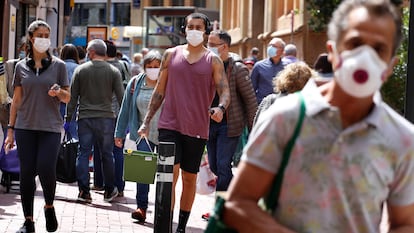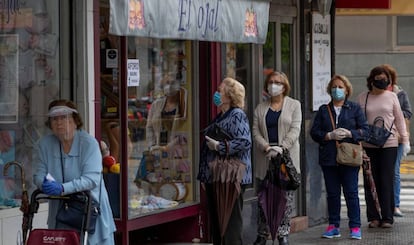Face masks in Spain will be compulsory in public spaces where social distancing cannot be respected
The personal protective equipment will need to be worn in closed areas and on the street where a two-meter safe distance against coronavirus contagion is not possible


The Spanish Health Ministry announced on Monday evening that the use of face masks in Spain will be obligatory in closed spaces and on the street where two-meter safe distances cannot be respected.
Health Minister Salvador Illa stated on Sunday that the government was considering extending the use of face masks, which have been compulsory on public transportation in Spain since May 4, when confinement measures were eased to allow residents to go outside for exercise and for walks. The health minister, however, provided no further details about the plan.
The best mask is a two-meter distanceFernando Simón, director of the Health Ministry’s Coordination Center for Health Alerts
The central government and regional leaders met Monday afternoon during a session of the Interterritorial Council of the National Health System (SNS) to discuss the proposal to extend the use of face masks. At that meeting, an agreement was struck to make the personal protective equipment obligatory in closed spaces and on the street “if it is not possible to guarantee a safe minimum distance of two meters,” according to a press release from the Health Ministry.
The issue of face masks has been one of the measures that has been subject to the most variations since the health crisis began. At first, authorities did not recommend that they be worn by people with no symptoms, then they did a U-turn and recommended that they should be used, before finally deciding that face masks would be compulsory on public transportation.
Until now, the use of face masks has been “recommended” in areas where two-meter safe distances cannot be respected. The ministerial order to extend their use will be published in the Official State Gazette (BOE) in the coming days. Once published, face masks will become obligatory in businesses and closed public spaces. The order will clarify under what conditions they must also be worn on the street.

The masks that are currently recommended for use by the public are the so-called hygienic masks or surgical ones. When used properly, they are more effective at preventing a person with the coronavirus infecting someone else, rather than avoiding being infected. At the start of the pandemic, it was thought that asymptomatic carriers of the coronavirus had little chance of transmitting it, which is why the majority of international organizations, including the European Center for Disease Protection and Control, and the World Health Organization (WHO), recommended they be reserved for those with signs of Covid-19, as well as healthcare workers.
But as time has passed, and more is known about the disease, it has become evident that people can pass on the coronavirus in the days prior to developing symptoms or even without having any symptoms at all.
In response to a question about the use of face masks, Fernando Simón, the director of the Health Ministry’s Coordination Center for Health Alerts, said last week: “I’m not going to give an opinion for or against them being obligatory. There is now a high recommendation for anyone who goes onto the street [to wear one]. Making them obligatory is to overact a bit, it might be okay, but perhaps we should act in other areas. The best mask is a two-meter distance.”
Simón, like other health experts, warned that wearing a face mask may be a problem for some people, such as those with anxiety, chronic pulmonary obstructive disease or other respiratory restriction issues.
English version by Melissa Kitson.
Tu suscripción se está usando en otro dispositivo
¿Quieres añadir otro usuario a tu suscripción?
Si continúas leyendo en este dispositivo, no se podrá leer en el otro.
FlechaTu suscripción se está usando en otro dispositivo y solo puedes acceder a EL PAÍS desde un dispositivo a la vez.
Si quieres compartir tu cuenta, cambia tu suscripción a la modalidad Premium, así podrás añadir otro usuario. Cada uno accederá con su propia cuenta de email, lo que os permitirá personalizar vuestra experiencia en EL PAÍS.
¿Tienes una suscripción de empresa? Accede aquí para contratar más cuentas.
En el caso de no saber quién está usando tu cuenta, te recomendamos cambiar tu contraseña aquí.
Si decides continuar compartiendo tu cuenta, este mensaje se mostrará en tu dispositivo y en el de la otra persona que está usando tu cuenta de forma indefinida, afectando a tu experiencia de lectura. Puedes consultar aquí los términos y condiciones de la suscripción digital.








































